More than 100 people arrested at UCLA and UC San Diego amid Gaza war protests
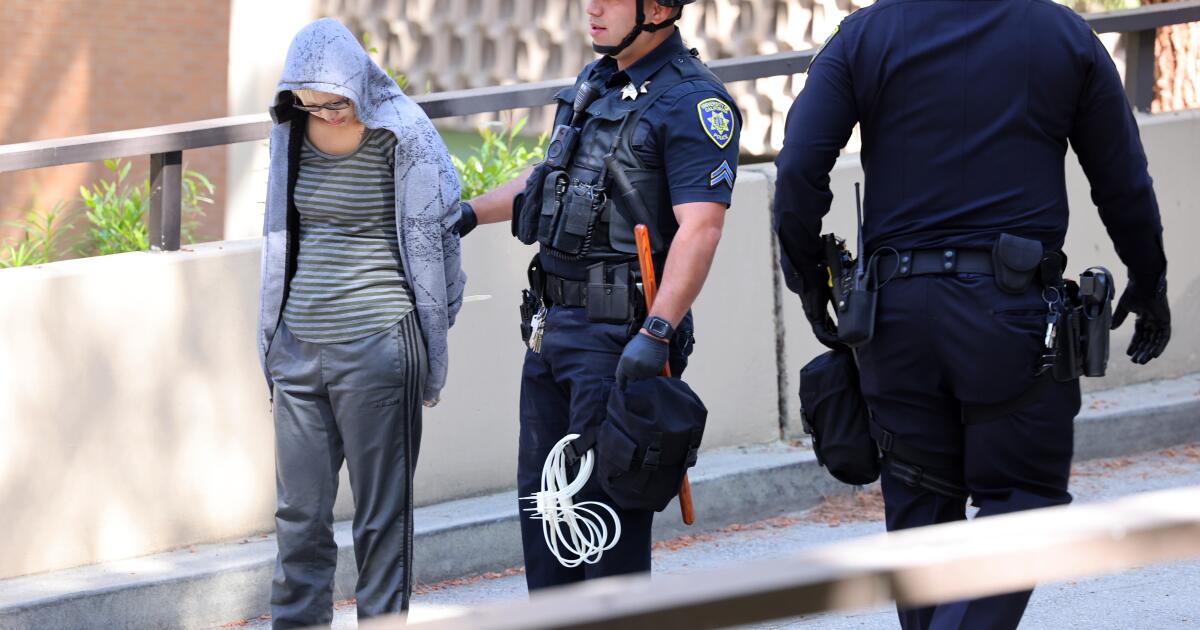
Intensified and rapid police action against protesters unfolded Monday at UCLA and other campuses, as university officials said there would be little tolerance for demonstrators who disrupted campus and violated laws and student codes of conduct following last week’s violence and tensions. Palestinian camps.
At UCLA on Monday, campus police arrested 44 pro-Palestinian protesters gathered in a parking lot — actions that students described as harassment and intimidation — as they gathered ahead of a peaceful protest. Other protesters were ordered to disperse when they entered a campus building. Classes have been moved online for the remainder of the week as a safety precaution.
The action comes after UCLA officials pledged to improve security after a violent mob last week attacked a pro-Palestinian encampment that was later demolished by law enforcement. UCLA’s police chief faced heavy criticism for the violence and his failure to get police involved quickly enough to quell the melee.
At UC San Diego, 64 people, including 40 students, were arrested. A growing pro-Palestinian encampment was declared illegal by the chancellor and emptied on Monday morning. After anti-Semitic graffiti was discovered on Cal State buildings in Los Angeles over the weekend, the university’s president increased campus security “to act quickly and decisively if further activity illegal activities were occurring.”
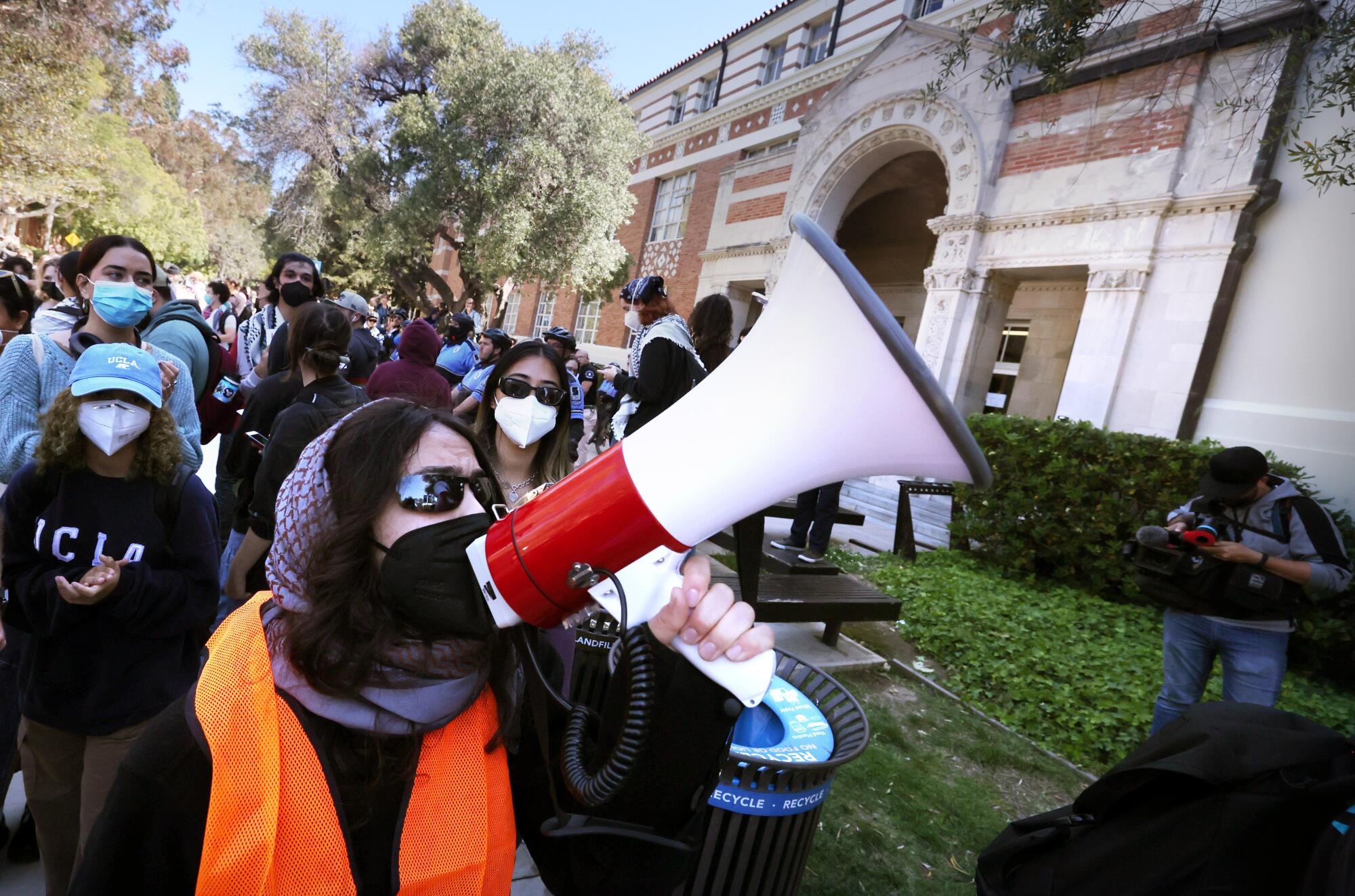
More protests broke out at UCLA on Monday, with police arresting several people gathered in a campus parking lot.
(Brian van der Brug/Los Angeles Times)
At USC – site of a pre-dawn police operation Sunday and the dismantling of a pro-Palestinian camp – security remained tight days before graduation. Only two campus entrances were open, with long lines of students waiting to go through identification checkpoints. A few days before graduation, high fences surrounded Alumni Park in the center of campus, where the encampment had been cleared.
USC President Carol Folt, in a letter to the USC community after police dismantled the camp on Sunday, said: “When free speech protests turn into illegal occupations, violating the rights of others, we must draw a line. »
Increased enforcement on the UC San Diego and UCLA campuses represents a change in tactics from a lighter approach that allowed students to set up encampments as part of their right to freedom of expression to support the Palestinians and demand an end to Israeli bombings in Gaza.
The response had to change in some encampments, where growing conflict led to skirmishes, blocking of some walkways, plywood fortifications and, ultimately, mob violence at UCLA, a UC source said who was not authorized to speak publicly.
“As the situation begins to worsen, universities are moving from a tolerant narrative of, ‘It’s okay, it’s free speech,’ to a more tolerant narrative of, ‘These things go beyond freedom of speech “. This hampers the university’s service delivery,” the source said. “It causes each of the universities to respond to how they are going to mitigate, circumvent or resolve what is happening on campus.
“There is no one-size-fits-all solution. The campuses all have their own identity and culture. And they’re all at different stages,” the source said.
Some students oppose increased security and have expressed concerns about police abuse of power after Monday’s arrests at UCLA.
“It’s really obvious that the university is showing us its strength, its power – whether it’s legal or not – to suppress what we’re trying to say,” said Marie Salem, media liaison for the solidarity camp. Palestinian from UCLA. She was not among those arrested, but said the arrests raised concerns among protesters who remained committed to calling for peace in Gaza.
“The university’s response is more police presence, more silencing, more intimidation,” said a 28-year-old graduate student. “We will continue.”
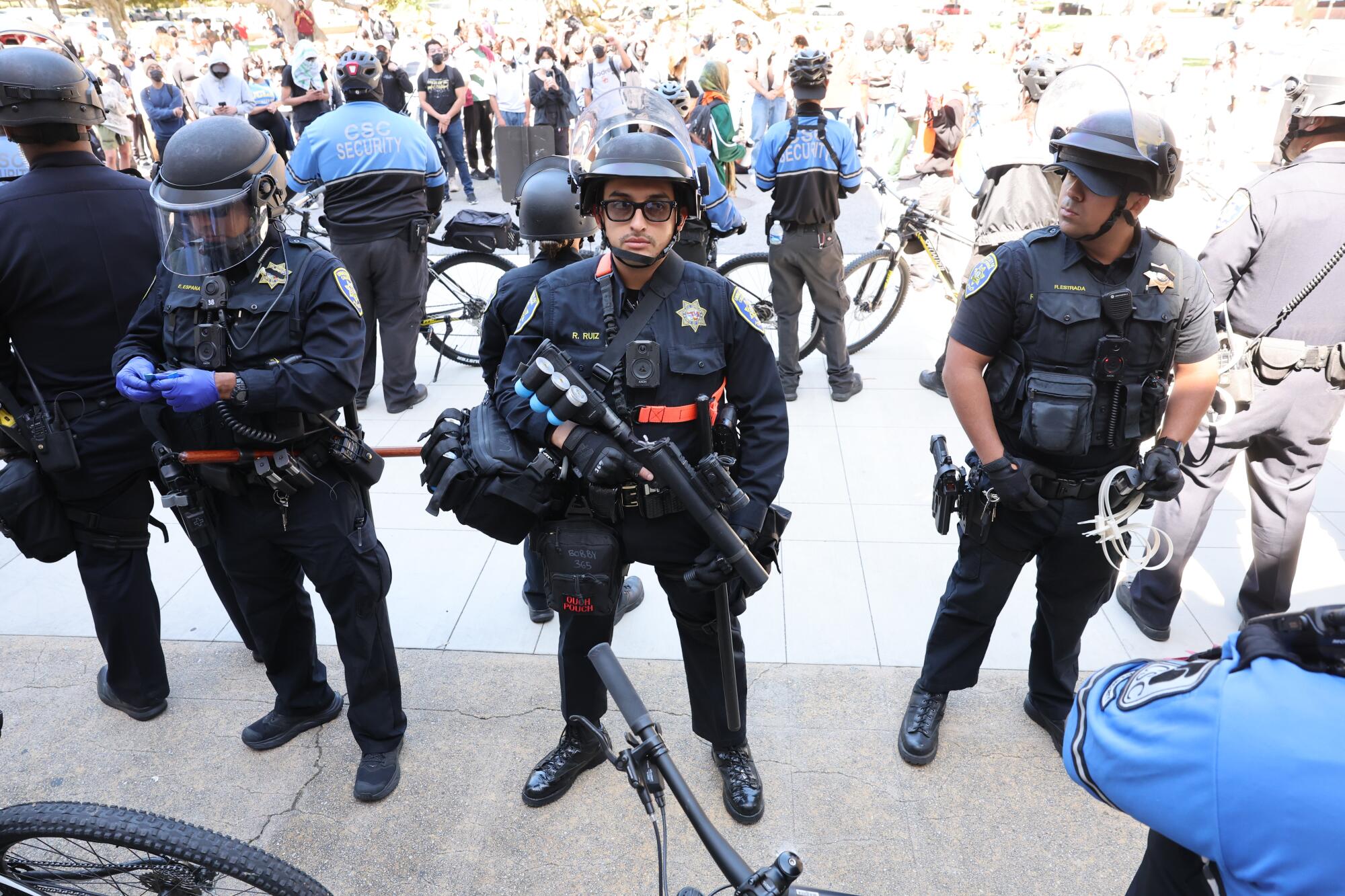
UC police stand outside Dodd Hall as new protests have emerged at UCLA.
(Brian van der Brug/Los Angeles Times)
Initially, an unidentified UCLA police officer told some reporters and observers that those arrested were being detained for delaying an investigation when asked to identify themselves to investigate a possible curfew violation, according to a video posted on social media platform X by a KNX News journalist. Hours later, however, a UCLA police lieutenant told the Daily Bruin that the 43 individuals were arrested on suspicion of conspiracy to commit burglary.
One student called the allegation false. The student shared a text sent Sunday about a “quiet sit-in style occupation of a building” with a meeting point Monday at 6 a.m. in the parking lot.
The LAPD and the Los Angeles County Sheriff’s Department, both at the scene, declined to comment on the incident, saying the UCLA Police Department was the lead agency. The sheriff’s department “is only involved in transportation,” said agency deputy spokeswoman Grace Medrano. UCLA officials did not respond to multiple questions about the nature of the arrests.
Those arrested Monday, all of whom appeared to be restrained, were escorted from the parking lot to a Los Angeles County Sheriff’s Department bus. Among those arrested was at least one independent journalist. He said he was charged with conspiracy to commit burglary, although he was initially arrested – and released – by officers who said he was violating a curfew for people not affiliated with the university. He denied engaging in any illegal behavior.
Meanwhile, at UC San Diego, students clashed with officers in riot gear, who descended on the encampment established five days ago, according to the San Diego Union-Tribune. University of San Diego police demolished the structure and arrested 64 people, including 40 students, on suspicion of unlawful assembly, a university spokesperson said..
The crackdown came a day after Chancellor Pradeep Khosla called the encampment “illegal” and said the group should disperse. Khosla stressed in a letter to the community that he continued to support freedom of expression, but said the camp, which had tripled in size since its creation, now posed an “unacceptable danger to safety and security “.
“As time passes, the threat and potential for violent clashes increases,” Khosla said.
Wooden stakes, propane tanks, metal and plywood shields, spray cans and a sword were found inside the camp, Khosla said in a statement Monday. Two minor injuries were reported in connection with police activity, he said.
“After the encampment was removed,” the statement said, “protesters interfered with police operations, including physically obstructing San Diego County Sheriff’s officers and buses, blocking movement, and banging on windows to attempt to obstruct the arrest process. This led to an additional arrest.
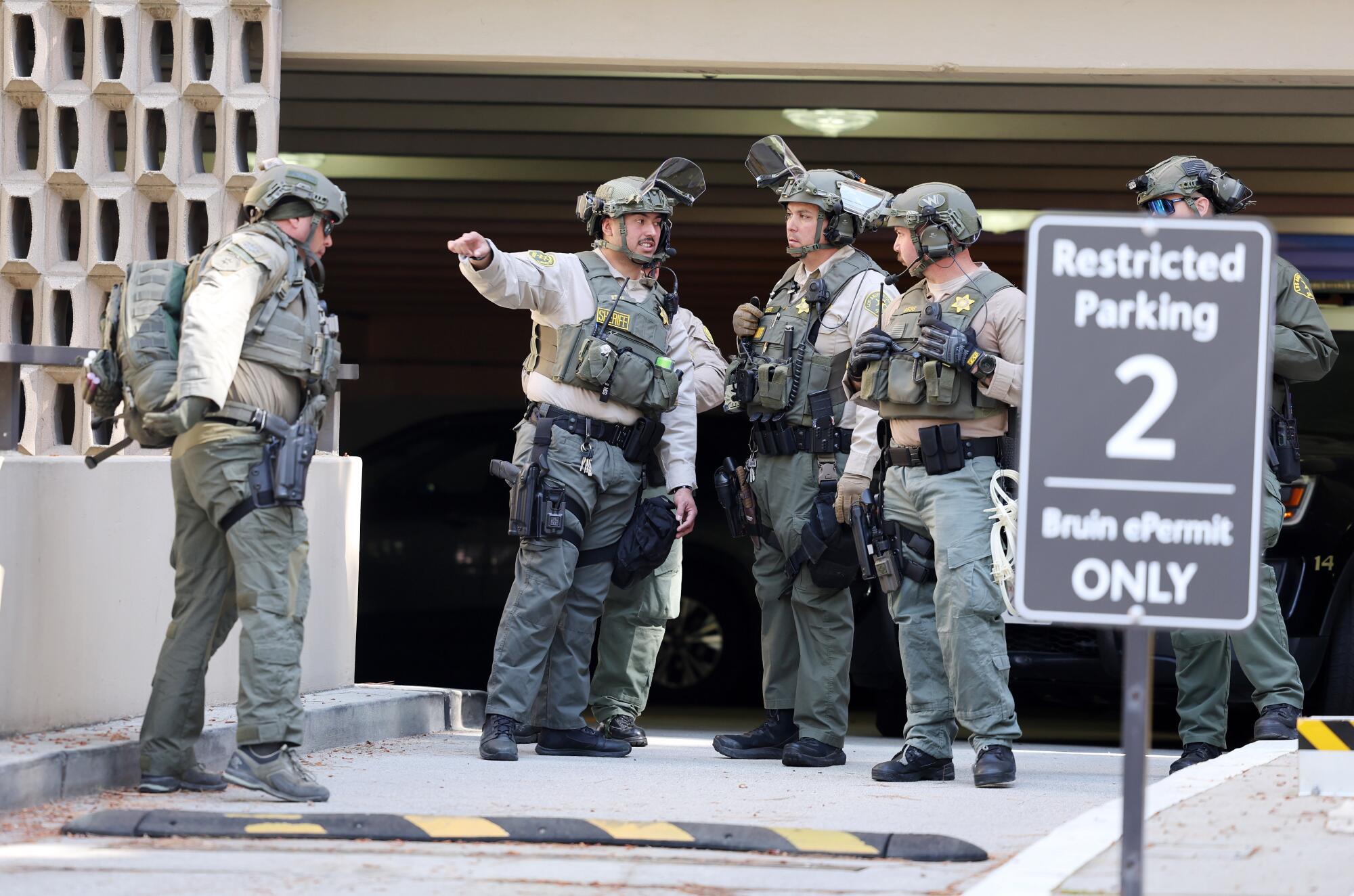
Police arrested several people Monday in a parking lot on the UCLA campus.
(Brian van der Brug/Los Angeles Times)
In accordance with UC community safety guidelines, campuses should first rely on communication with protesters to attempt to resolve issues and call police as a very last resort. These guidelines were adopted after UC Davis police pepper-sprayed students to protest economic inequality in 2011 — actions that sparked a firestorm of controversy, the firing of at least one police officer and a system-wide review and report outlining new practices.
But as protests over the Israeli-Palestinian conflict evolve on some campuses, so does the approach to dealing with them, the UC source said.
Of the encampments set up on eight of UC’s nine undergraduate campuses, only UCLA and UC San Diego called on law enforcement to dismantle them and made arrests as the sites began to experience more conflicts.
UC Irvine was moving in that direction, but as things calmed down and conversations with protesters continued, the encampment remained intact. UC Davis students set up camp in the grassy field Monday; Campus officials are allowing it for now because it has remained small and peaceful. Such camps also remain on the UC campuses in Santa Barbara, Berkeley and Santa Cruz.
After a mob attack last week, UCLA Chancellor Gene Block announced Sunday the creation of a new campus security office to oversee the university’s police department and emergency management operations . The new office is led by former Sacramento Police Chief Rick Braziel. Braziel reports directly to Block in a new unit focused solely on security. Previously, security operations were overseen by Administrative Vice Chancellor Michael Beck, among other responsibilities.
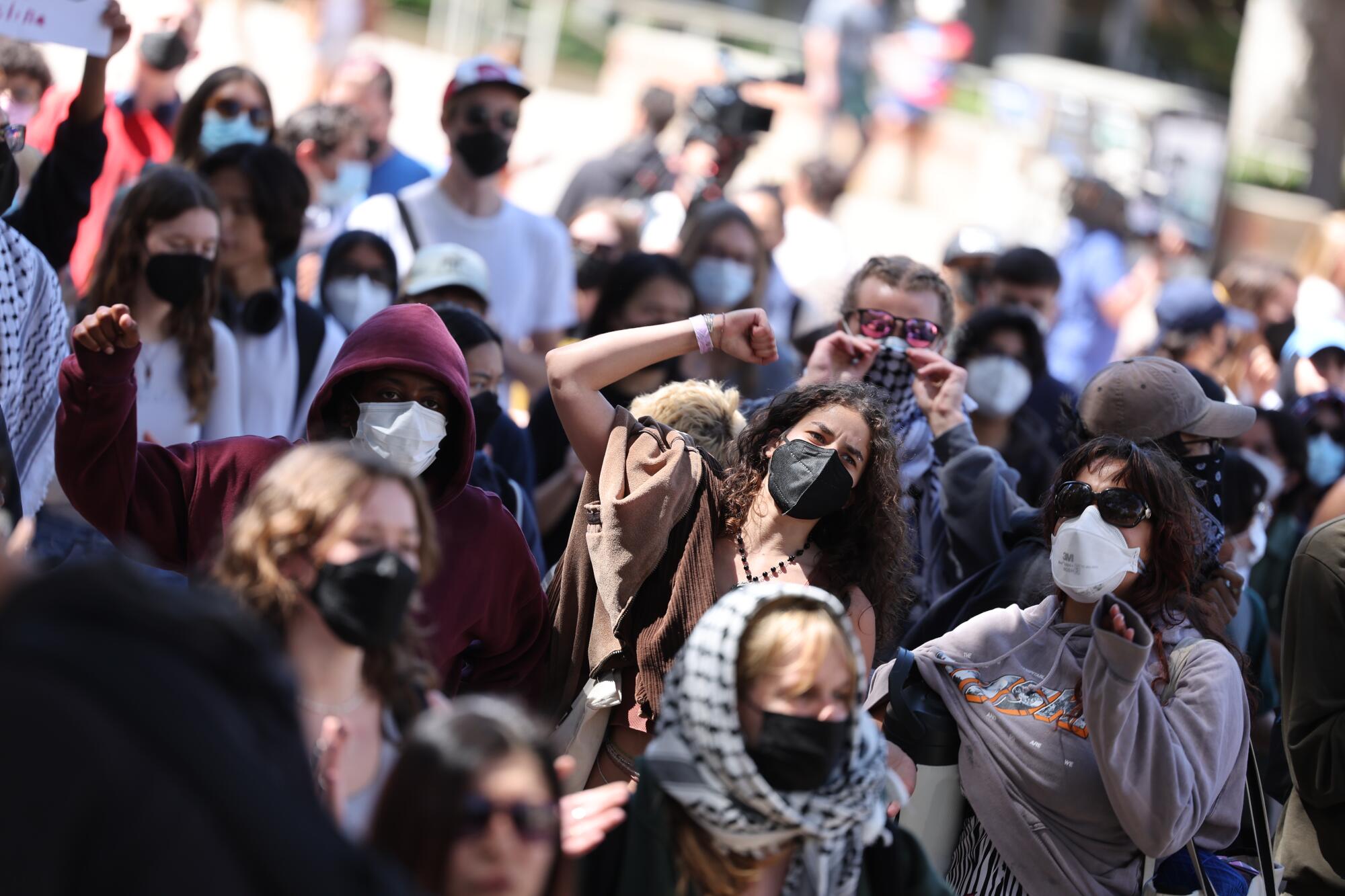
More protests broke out at UCLA on Monday.
(Brian van der Brug/Los Angeles Times)
Although Braziel took office immediately Sunday, UCLA Police Chief John Thomas remains in command of the police department. It was unclear whether Thomas increased the number of UCLA officers on duty Monday or what direction he gave them.
But as unrest continued on campus Monday, Thomas’ ability to effectively manage operations and communicate crucial information to the media and public, including details of arrests, was called into question.
Calls for his resignation were now “heartbreaking,” according to a source who was not authorized to speak publicly. Three sources told The Times last week that Thomas failed to provide a written security plan or recruit enough law enforcement officers to keep the campus community safe.
He defended his actions, telling the Times last week that he did “everything I could” to call enough police to protect the community.
Times writers James Queally, Summer Lin, Ashley Ahn and photographer Brian van der Brug contributed to this report.
California Daily Newspapers





